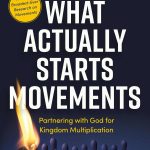Jerry Rankin recently addressed this difficult question in a story posted on the Zwemer website at…
http://www.zwemercenter.com/the-truth-about-muhammad/
I’ve heard other believers confront one another on this difficult and challenging question previously… and Jerry Rankin’s write-up is worth the read. After reading the article, we’re curious about your feedback. Could you read then click comment following the web version of this item, and share your take on Rankin’s thoughts. Has it ever been confusing for you that Arabic-speaking Christians use the same name for God as their Muslim neighbors? Does Rankin’s article straighten it out for you? Can you imagine the name as a “bridge?” If so, how? If you had to explain it all to a Muslim, how would you word it? Thanks in advance for any comments you can offer.












I think Mr Rankin is right on with his analogy. This has been my understanding of the use of Allah between both cross cultural Christians as well as Muslims. To me the hard part is communicating the difference to muslims.
Andy Bannister with RZIM delivers one of the best explanations on this subject, and in only 2 1/2 minutes here:
https://vimeo.com/115440679
As someone who works with Arabs in Jordan, utilizing their language in proclamation and in discipleship, I would like to provide a few comments on Dr. Rankin’s article:
– Firstly, the word “Allah” isn’t really an issue, except to people who don’t speak Arabic as their first language; in Arabic it just means “The god”. However, Christians and Muslims here in Jordan (and throughout the Middle East) all recognize that although we all use the same word for “God”, Christians are speaking about one person while Muslims are speaking of a different person/personality. Watch the video link above for some of those reasons from a Biblical perspective.
– Secondly, I agree with the author that “Jews worship the true and living God and seek to live according to His laws”. Of course they do, they are reading from the same 39 books as Christians, known to us as the Old Testament. And he is also correct in that they do not worship Him in full knowledge, i.e. that the Messiah has already come once, and will come again. However, scripture says that they (Israel/Jews) will recognize the Messiah in the future and mourn him (Zechariah 12:10).
– Thirdly, the Quran denies the basic tenets of the Gospel. Paul uses very strong language in Galatians 1:6-9 against those who would preach a different ‘gospel’. There are many other references throughout the Bible, but 1 John 1:22 says, “Who is the liar, if not the one who denies that Jesus is the Messiah? He is the anti-christ, the one who denies the Father and the Son…” and 1 John ends by saying, “…We are in the true One—that is, in His Son Jesus Christ. He is the true God and eternal life…”
The ‘God’, i.e. ‘Allah’ of the Quran, cannot be the same as the God of the Bible. The ‘Allah’ of the Quran denies the Father and the Son and the death, burial and resurrection of the Son on the cross. As Paul says, anathema!
Finally, why do Muslims say in Arabic, “Allahu akbar!”, which interpreted means, “The god (Allah) of the Quran is bigger/badder/stronger than…any other god”— including the God of the Bible? It’s because they believe that in the end, the god described in the Quran will rule over all creation and everyone will become Muslims.
Why do Christians say (in every language), “Jesus Christ is Risen! He is risen indeed!”? Because, truly, in the end, He is God in flesh, who gave himself as the sacrifice for all sin, was buried, and rose again on the third day!
John wrote “In the beginning was the Word. And the Word was with God. And the Word was God.” Jesus Christ of the Bible is not equal to the Allah of the Quran. And as we know, only One can rule in the end, and He is Jesus the Messiah, the Son of the Living God.
We served for 30 years in the M.East & N.Africa. I preached and taught in Arabic for over 25 years. I always used “allah” when referring to God. There is no other Arabic word to use for that purpose.
Muslims and Christians believe many of the same concepts about God and Jesus: He is Creator and Sustainer of the universe. He is transcendent. Jesus was born of a virgin, was sinless, performed miracles, rose into heaven and will come to earth again. We differ from Muslims in our concept of the nature of God. For Muslims, His basic nature is power; for Christians it is Love. In Islam God is not personal and is unknowable. For Christians He is both personal and knowable. Muslims deny the crucifixion of Jesus in defense of the righteousness of God. Jesus was sinless and therefore did not deserve to die a shameful death as a criminal. God is righteous and holy and would NEVER allow that. But Christians believe that Christ’s death was a NECESSITY without which there could be no resurrection and no hope for salvation. They believe that Jesus was God’s sacrificial Lamb, sacrificed for us to pay the debt that our sins demand of us.
So, Muslims and Christians worship the same divine Creator but differ considerably as to His nature and how he deals with people.
Mr. Rankin says, “There is not two separate divine beings worshipped respectively by Christians and Muslims…” He has decided that the difference is in one’s theology (beliefs). In fact, there are two beings being worshipped…only one is divine. Allah is a demon god who, according to the Koran has no son.
While it is true that Christian arabic-speaking people refer to the very God we worship by the name Allah. However, the demon god is also worshipped by that name. Plus, Muslim worshippers in other nations that are not arabic-speaking, like Iran, Indonesia and others, refer to their demon god as “Allah.”
One more point. One of my closest Christians friends, an evangelist in Nigeria, was son of a very high-level imam in Nigeria. My friend was being groomed for such a position. He maintains that there are major secrets known only to those who reach the higher levels of Muslim leadership.
He is a wonderful, victorious Christian minister. From his experience, he knows Allah to be the demon god I mentioned above.
I asked him how Imams can fill a room full of elementary age boys and have them pray and learn the Koran in unison for hours. He says, “We were demonized.”
Good article.
It does not try to deal with more complex situations, such as in Turkish where there are two words for God — a Turkic one, Tanrı, and an Arabic one, Allah. Some Bible translations use Tanrı, others Allah. One can see taxicabs in Istanbul with the inscriptions “Tanrı korusun,” “Allah korusun,” and “Maşallah.” All mean “Let God protect.” And there is a high probability that all of the owners are Muslims. I’m sure there are many other examples — such as in Malaysia, where Christians are forbidden to call God Allah.
It is, however, a very useful article for probably most situations.
I agree with the linguistic comments – Allah is the word for God and so is appropriate to be used.
I do not agree that “There is not two separate divine beings worshipped respectively by Christians and Muslims…”
If I asked you if you knew my friend John and you said, “Oh, yes – isn’t he the one that is 7 feet tall and weighs 400 pounds?” I would not think that we were thinking about the same person. A person’s nature (how they are accurately described) cannot be separated from their identity.
The Allah I worship and love is different in identity than the Allah in the Koran.
Probably the more helpful comment to make is that most religions ascribe a particular name to their God. JWs talk about “Jehovah” and “Allah” is normally considered in connection with Islam (notwithstanding the accurate linguistic comments). So what is the distinctive name we have for OUR God?
Jesus.
No Muslim would agree that Jesus and Allah are the same.
Timothy Tennent’s chapter called “Is the God of Muhammed the Father of Jesus?” from his book Theology in the Context of World Christianity is the best treatment of this topic of which I know. Don’t confuse it with the book of the same title by Timothy George.
Based upon your recommendation I purchase the book on Kindle and read that chapter. I agree that it is very well written and comes to some good conclusions regarding the question, “Is the Father of Jesus the same as the Allah of the Quran?” He also does a great job of breaking down the nuances of the different ways that people ask this question and similar ones in the same vein.
However, I wonder if the author paid any attention to his own Biblical studies and his own conclusions when he wrote about Muhammad. Of that small portion of the chapter, I believe his statements regarding the supposed prophetic nature of Muhammad to be absolutely wrongheaded. All that Muhammad did was to bring a people from one wrong path to another equally wrong path, both of which lead to destruction.
As Doug Lucas likes to say, “Eat the corn, throw away the cob.” This chapter has some good corn, but a big ole cob that needs to be discarded.
So the word they use is not important as how they understand the Diety of Christ. We often have used Venn diagrams to illustrate the differences and similarities of the three monotheistic religions. It is amazing how much falls into the center intersection of the three circles. Also, I have been calling Him Yaweh for quit some time, and people get it or ask why.. And then I say…